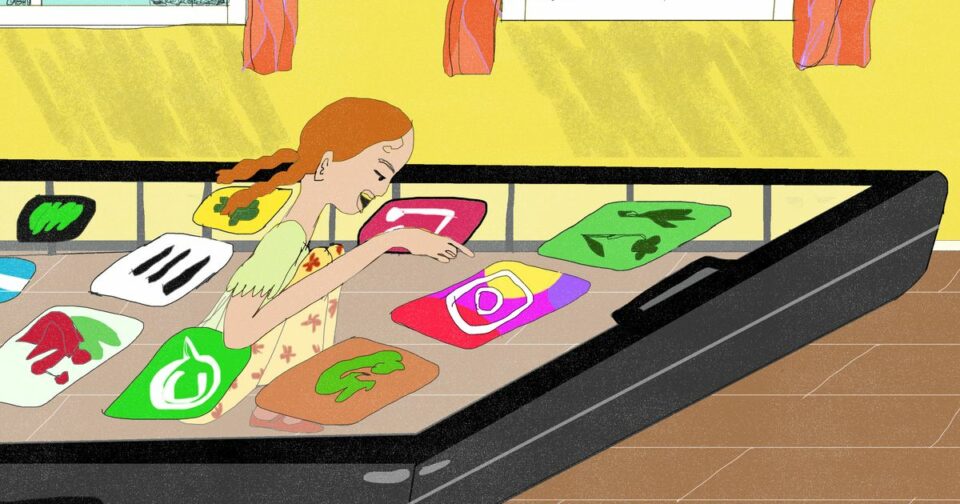
This article originally appeared in Brooding, a subscriber-exclusive newsletter about modern family life. Sign up here.
I got my first smartphone a month before I had my first kid, which has probably made my relationship with my phone slightly more neurotic than the average person’s. My brain was developing its very first distracted-by-the-phone synapses (or whatever they’re called) at the exact same time as it was trying to grow caring-for-my-baby synapses. I imagined these fresh new brain activations occurring in competition with each other — the caring for my kid trying to outcompete the phone, sometimes winning, sometimes falling behind.
In those early days, I became painfully aware that my phone was taking up time that I would have otherwise spent doing other things. I began to catastrophize, even back in 2011: What was I doing less of now that I was allocating time to my phone?
A few years later, after I’d had a second kid, I decided to do a master’s degree in digital anthropology. I wanted to figure out how people’s daily lives had adapted to accommodate phone use. For my thesis, I interviewed a group of women about when and why they spent long amounts of time on their phones and measured their phone-use windows. What I found was that most of these women timed their epic scroll-and-text sessions to coincide with their kids’ screen time. It was a tiny study, but I noticed something: They were giving their kids screen time largely in order to accommodate their own.
The screen-time debate around early childhood became unbearably sanctimonious around then, so I decided to step back from the whole topic. I didn’t like the idea of shaming people into changing their behavior, and I suspected we were experiencing the same sort of predictable moral panic that accompanies any big change in technology use: People thought radio was ruining children’s futures too, once upon a time.
But I’ve never been able to silence my inner panic — not just about screens and kids, but about adults. It’s been a private obsession that is tedious to bring up, so I never do. No one wants to talk about it. We’re all on our phones too much, we all know it, and we make our peace with it individually. The idea that parents need yet another thing to feel bad about is perverse. What do I want to do, lose friends? Hate myself forever?
While reading Jonathan Haidt’s recent long, evidence-filled manifesto in The Atlantic, “End the Phone-Based Childhood Now,” I began to think about how this line of thinking has become costly to ignore. (Haidt’s book on which the article is based, The Anxious Generation: How the Great Rewiring of Childhood Is Causing an Epidemic of Mental Illness, came out on March 26.) He argues that indicators of childhood well-being in developed nations began precipitously decreasing at exactly the same time that smartphones became widely available. He argues, thoroughly, that these falling indicators can’t be linked to any one nation’s problem — instead, it’s the common denominator we all share. It’s not America and its guns. It’s not South Korea and its pressure on young people to test into professions. It’s everywhere, and it’s the phones.
There is nuance to Haidt’s evidence, even though it is overwhelmingly making a simple, unambiguous argument. He identifies two entwined causes of the decline in young people’s mental health and well-being: parents’ increased protectiveness of their children and children’s increased access to smartphones. It’s not the fault of video games or even social media per se. (Millennials came of age with video games with no measurable harm done, and younger millennials came of age with social media in the desktop era — no lasting scars but for the embarrassing Facebook pics from 2007.) The problem is in the mobility of the technology. It’s the affordances of privacy and portability, and the access to these affordances, that parents have given their children.
Ultimately, what Haidt is implying, with the utmost tact, is that we parents need to start acting differently. Our kids’ reliance on mobile devices to pass the time starts long before high school, and it coalesces into an unshakeable habit under our watch — or, rather, while our gaze is averted and we’re looking at our phones. No legislation, no industry-oversight panel, is going to help us. Apple’s and Google’s executives know enough to withhold mobile devices from their kids, but they’re not going to stop selling them to ours.
What Haidt doesn’t say is that parents can’t change their kids’ relationships with their phones and tablets without also addressing their own. Criticizing parents is very treacherous for any public figure, so it’s understandable that Haidt would avoid doing so.
People with very strong opinions about parenting are usually pushing a skewed ideological agenda and are best ignored. A “screen-free childhood”? Sounds precious. No thanks! Haidt may be an over-50 white guy, but he is not making an ideological argument in this book. His suggestions are realistic, and his argument is not shrill. We’re beyond moral panic. I know many children who are absolutely addicted to their mobile devices, whether we’re talking about a Nintendo Switch, a phone, or an iPad. This circumstance is normal now — so normal, in fact, that you’d be rude and tasteless to remark on it. Our social norms have been very quickly reshaped around this behavior. Kids who aren’t on iPads at the restaurant are the ones who get remarked on, not those who are.
It’s a lot like any other kind of addiction: We’ve learned to tread very lightly around it, to explain it away. But unlike adults who live with addiction, children are not responsible for themselves. They can reasonably expect their parents to take responsibility for them, at least until high school. (At which point even Haidt says they get to have phones, so all bets are off!)
The impossible condition of parenting is part of what has gotten us here. Parents work too much, and there is no affordable care infrastructure anywhere. It is inevitable for many parents to be working while trying to care for young children. But we do a lot more on our phones than work. It’s where we socialize and stay in touch, and the inflated amount of time we spend texting alone is a monopolizing factor. Is it possible that we have reached peak texting? Would it be possible for us to text less? I am nauseated at the thought of texting more — I truly hope we’ve hit our limit, but who am I kidding? We are at least as addicted to our phones as our kids are; we need them in order to relax. And since we don’t feel safe letting our kids wander around the neighborhood freely while we scroll in peace, we keep them inside with us, scrolling.
It’s not just the parents who can’t afford child care whose children are addicted to their phones by age 10. Many parents of means and privilege rely on phones to keep their kids “happy” to a degree that is — and here I’m going to break the No. 1 rule of parenting writing and shame people — totally gratuitous and lazy. I would be very interested to read a study of parents explaining why they have their children eat dinner in front of an iPad: For many people it’s exhaustion at the end of a long day, but for others it’s an unwillingness to deal with the challenging task of teaching your kids how to act. People tether their children to iPads so as to streamline and optimize their own lives, to avoid meltdowns and chaos. Everyone can be engaged in a semblance of respectable pantomimed productivity through their individual screens, and peace can reign. No messes, no fighting, no whining.
In cases like these, I wonder if there has been a conceptual slippage in our shared definition of childhood happiness. We have come to think of our children as happy when most of the time we’re just experiencing a reduction of our own stress. Happiness in the Platonic and Aristotelian senses means what we’d call flourishing — a healthy balance of work and pleasure. In the case of kids, you might call it a healthy balance between challenging and familiar play ideally, from a parent’s perspective, done out of immediate earshot. The safety and passivity that parents associate with kids on their iPads should not be conflated with happiness. It’s convenience, mostly — for parents.
One of the most resonant points Haidt makes is that one of the consequences of our reliance on our phones is “the decay of wisdom and loss of meaning.” I know this has a whiff of David Brooks about it, but I nonetheless fear that Haidt is right. Yes, we create lots of excellent meaning (and wisdom, lol) with our memes. My son asked me yesterday if I thought there are “memes about everything,” and I thought about it for a moment and said “Yes, son, I do.” He was in awe, and I agreed that memes truly are a wonder of human industry. But discursive meaning, and its attendant lulz, are no match for the wisdom and meaning that we create through social interaction, the risks we take to make ourselves understood to each other, the care we learn to give one another. Haidt offers a lot of interesting data to back this up for those of us who might be skeptical.
He closes the article with four suggested new norms that could help us break free from this trap: no smartphones before high school, no social media before 16, phone-free schools, and (my favorite) more free play and responsibility in the real world. All great ideas, but parents’ habits and beliefs are on the hook, too. We can’t expect our kids to emancipate themselves from their devices until we’re more self-aware about our relationship to ours. Yes, we need more care infrastructure. We need public spaces where kids can move independently. But what would happen if we didn’t have smartphones at all? It’s unlikely that we would imprison our children for their own safety. We would let them be in the world despite our government’s indifference to their safety. We’d risk it, and we’d be right to.
By Kathryn Jezer-Morton , 2024-03-30 13:00:49
Source link


